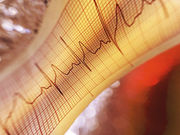A-fib tied to central apnea, Cheyne Stokes respiration, apnea hypopnea index in men aged ≥76
TUESDAY, Nov. 24, 2015 (HealthDay News) — Central sleep apnea and Cheyne Stokes respiration predict incident atrial fibrillation in older men, according to a study published online Nov. 23 in the American Journal of Respiratory and Critical Care Medicine.
Anna M. May, M.D., from the University Hospitals Case Medical Center in Cleveland, and colleagues examined sleep disordered breathing indices as predictors of incident atrial fibrillation in a cohort of 843 ambulatory older men. Baseline sleep indices were assessed: apnea hypopnea index, central sleep apnea, central sleep apnea or Cheyne Stokes Respiration, obstructive apnea hypopnea index, and percentage sleep time with <90 percent oxygen saturation. The authors ascertained incident clinically-symptomatic adjudicated or self-reported atrial fibrillation during a mean follow-up of 6.5 years.
The researchers found that incident atrial fibrillation was predicted by central sleep apnea (odds ratio, 2.58) and central sleep apnea-Cheyne Stokes respiration (odds ratio, 2.27), but not by obstructive apnea or hypoxemia. Interaction terms were significant for central apnea, Cheyne Stokes, and sleep-disordered breathing with age. Among participants aged 76 years or older, but not younger participants, atrial fibrillation correlated with central apnea, central apnea-Cheyne Stokes respiration, and apnea hypopnea index (odds ratios, 9.97, 6.31, and 1.22 per five-unit increase, respectively).
“In older men, central apnea and Cheyne Stokes respiration predicted increased atrial fibrillation risk, with findings strongest in older participants in whom overall sleep disordered breathing also increased atrial fibrillation risk,” the authors write.
Full Text (subscription or payment may be required)
Copyright © 2015 HealthDay. All rights reserved.








